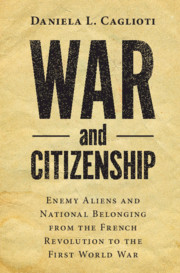 War and Citizenship
War and Citizenship Book contents
- War and Citizenship
- Human Rights in History
- War and Citizenship
- Copyright page
- Dedication
- Contents
- Table
- Acknowledgments
- Note on Translation
- Abbreviations
- Introduction
- Part I Background
- 1 The Emergence of the Enemy Alien
- 2 Enemy Aliens and “Civilization” in Warfare
- 3 Citizens and Aliens in Peacetime
- Part II The First World War
- Part III Aftermath
- Endnotes
- Works Cited
- Index
1 - The Emergence of the Enemy Alien
from Part I - Background
Published online by Cambridge University Press: 30 October 2020
- War and Citizenship
- Human Rights in History
- War and Citizenship
- Copyright page
- Dedication
- Contents
- Table
- Acknowledgments
- Note on Translation
- Abbreviations
- Introduction
- Part I Background
- 1 The Emergence of the Enemy Alien
- 2 Enemy Aliens and “Civilization” in Warfare
- 3 Citizens and Aliens in Peacetime
- Part II The First World War
- Part III Aftermath
- Endnotes
- Works Cited
- Index
Summary
This chapter opens the first part of the book that presents the background of the First World War. It deals with the emergence of the concept of “enemy alien” in the debate among international lawyers. Starting with the Law of Nations published by Emer de Vattel in 1758, it analyzes and discusses what the foundational texts of international law in the century-and-a-half preceding the First World War said on the rights of foreigners in peacetime and on the conduct toward these same foreigners when they became enemies in wartime. It then compares legal doctrines and practices analyzing the behavior of belligerents towards enemy aliens in a string of interstate wars that occurred between the end of the eighteenth century and 1865, namely the French Revolutionary Wars of 1792–1793, the Napoleonic Wars, the War of 1812 between Britain and the United States, the Crimean War and the American Civil War. The chapter follows the changes in the attitude toward enemy aliens that mass conscription and the post-French Revolution concept of citizenship and nationality triggered.
Keywords
- Type
- Chapter
- Information
- War and CitizenshipEnemy Aliens and National Belonging from the French Revolution to the First World War, pp. 17 - 39Publisher: Cambridge University PressPrint publication year: 2020
